英语句型转换专项练习
(完整版)小学英语句型转换专练500题
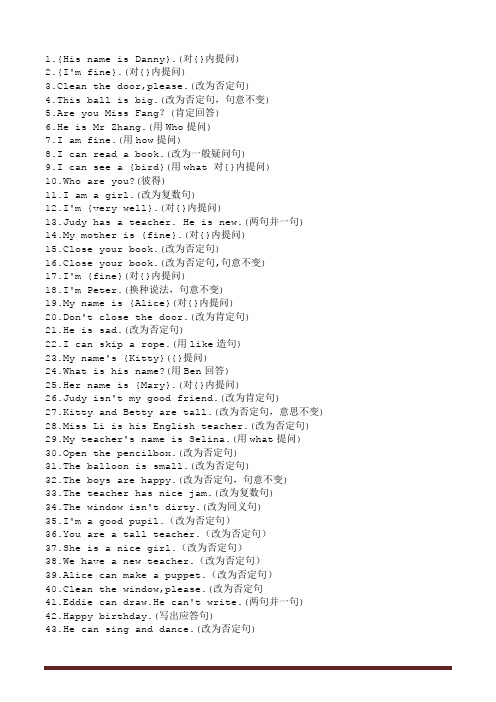
1.{His name is Danny}.(对{}内提问)2.{I'm fine}.(对{}内提问)3.Clean the door,please.(改为否定句)4.This ball is big.(改为否定句,句意不变)5.Are you Miss Fang?(肯定回答)6.He is Mr Zhang.(用Who提问)7.I am fine.(用how提问)8.I can read a book.(改为一般疑问句)9.I can see a {bird}(用what 对{}内提问)10.Who are you?(彼得)11.I am a girl.(改为复数句)12.I'm {very well}.(对{}内提问)13.Judy has a teacher. He is new.(两句并一句)14.My mother is {fine}.(对{}内提问)15.Close your book.(改为否定句)16.Close your book.(改为否定句,句意不变)17.I'm {fine}(对{}内提问)18.I'm Peter.(换种说法,句意不变)19.My name is {Alice}(对{}内提问)20.Don't close the door.(改为肯定句)21.He is sad.(改为否定句)22.I can skip a rope.(用like造句)23.My name's {Kitty}({}提问)24.What is his name?(用Ben回答)25.Her name is {Mary}.(对{}内提问)26.Judy isn't my good friend.(改为肯定句)27.Kitty and Betty are tall.(改为否定句,意思不变)28.Miss Li is his English teacher.(改为否定句)29.My teacher's name is Selina.(用what提问)30.Open the pencilbox.(改为否定句)31.The balloon is small.(改为否定句)32.The boys are happy.(改为否定句,句意不变)33.The teacher has nice jam.(改为复数句)34.The window isn't dirty.(改为同义句)35.I'm a good pupil.(改为否定句)36.You are a tall teacher.(改为否定句)37.She is a nice girl.(改为否定句)38.We have a new teacher.(改为否定句)39.Alice can make a puppet.(改为否定句)40.Clean the window,please.(改为否定句41.Eddie can draw.He can't write.(两句并一句)42.Happy birthday.(写出应答句)43.He can sing and dance.(改为否定句)44.Here is your cake.(改为复数句)45.I'm eight.(改为一般疑问句)46.Kitty is {ten}.(对{}内提问)47.My friend is {eight years old}.(对{}内提问)48.My name is {Kitty}.(对{}内提问)49.Today is hot.(改为否定句,句意不变)50.He is {fine}.(就{}内提问)51.I can draw a tree.(改为一般疑问句,并作否定回答)52.I'm {eight years old}.({}内提问)53.I'm {Kitty}.({}内提问)54.She is eight.(改为否定句)55.My friend is{five years old}.({}内提问)56.My name is {Linda}.(对{}内提问)57.Peter is eight years old.(改为一般疑问句)58.Today is cold.(改为否定句)59.Today is cold.(改为否定句,句意不变)60.Are you ten?(肯定回答)61.Are you two years old?(否定回答)62.Judy and Lily are both ten.(改为一般疑问句)63.Judy can count the rulers.(改为一般疑问句)64.Kitty is {nine}.(对{}内提问)65.Miss Cat is {ten years old}.(对{}内提问)66.Mrs Fang can draw a big tree.(改为否定句)67.My sister is ten.(改为一般疑问句)68.She's one.(改为同义句)69.Wendy and Peter can draw {the trees}.(对{}内提问)70.You are Mr Cat.(改为否定句)71.Peter is Chinese.(一般疑问句,肯定回答)72.{Kitty}is my good friend.(对{}内提问)73.Her name is {Alice}.(对{}内提问)74.My tail is not long.(改为肯定句,句意不变)75.That's {a nice kite}.({}内提问)76.{Peter} is my good friend.({}内提问)77.He isn't thin.(改为肯定句,句意不变)78.My eyes are big.(改为否定句,句意不变)79.That's {a nice gift}.({}内提问)80.They are teachers.(改为否定句)81.{Mary}is my good friend.({}内提问}82.His brother is{ten years old}.({}内提问)83.My name is {Peter}.({}内提问)84.My tail is long.(改为否定句)85.My tail is long.(改为否定句,句意不变)86.This is a picture of my family.(改为一般疑问句)87.{Kitty} is my friend.({}内提问)88.{Linda} is my friend.(对{}内提问)89.Alice can read and write.(改为否定句)90.He is thin.(改为一般疑问句)91.Mary is tall.(改为否定句,句意不变)92.My friend is {ten years old}.(对{}内提问)93.She's {Mary}.({}内提问)94.That short girl is{five}.(对{}内提问)95.He can jump very high.(改为否定句)96.I can see {two}babies.({}内提问)97.My friend is {eight}.({}内提问)98.My friend is {Kitty}.({}内提问)99.She is tall and thin.(改为一般疑问句,并作否定回答) 100.Alice is my good friend.(改为一般疑问句)101.Danny is big and tall.(改为一般疑问句,肯定回答) 102.He is {eight}.(对{}内提问)103.Her name is {Lucy}.(对{}内提问)104.I have a good friend.(改为一般疑问句)105.I'm {fine}(对{}内提问)106.Is Linda thin and small?(改为肯定句)107.Is Tom fat? (肯定回答)108.It's {a book}.(对{}内提问)109.Kitty is thirsty.(改为一般疑问句)110.My father can swim.(改为一般疑问句)111.My father is tall.(改为否定句,句意不变)112.My friend is tall and fat.(改为否定句,句意不变) 113.My hair is {black}.(对{}内提问)114.My sister is {eight}.(对{}内提问)115.My sister is {ten}.(对{}内提问)116.My teacher can sing.(用what提问)117.She can dance.She can't swim.(用but将两句并一句) 118.She is {Mary}.(对{}内提问)119.She is Kitty Li.(用who提问)120.She is thin.(改为否定句,句意不变)121.She's my {little sister}.(对{}内提问)122.The clouds are {blue}.(对{}内提问)123.We like tigers.(改为否定句)124.{Paul} is my good friend.(对{}内提问)125.Are you Mary?(作否定回答)126.Don't clean the table.(改为肯定句)127.I can draw. I can't swim.(两句并一句)128.My father can swim.(改为否定句)129.Sam is tall.(改为否定句,句意不变)130.This is a picture of my family.(改为一般疑问句,并作肯定回答) 131.We are good friends.(改为否定句)132.Your brother is short.(改为否定句,句意不变)133.He's five.(改成特殊疑问句)134.I am a pupil.(改成一般疑问句)135.I am your sister.(改成一般疑问句)136.I like it.(改成一般疑问句)137.It's a cat.(改成特殊疑问句)138.Mr Li is tall.(改成一般疑问句,并作否定回答)139.My father and my mother are tall.(改为否定句)140.She is eight.(改成一般疑问句,并作否定回答)141.Susie is tall.(改成一般疑问句)142.He is {my grandfather}.({}内提问)143.I am {fine}({}内提问)144.She is a new teacher.(改为一般疑问句,并作否定回答)145.She is my sister.(改为否定句)146. Your brother is tall.(改为否定句)147. Your brother is tall.(改为否定句,句意不变)148.{Danny} is my good friend.(对{}内提问)149.His name is {Sam}.(对{}内提问)150.That is a new book.(改为一般疑问句)151.He is my good friend.(改为否定句)152.It is {a bag}.(对{}内提问)153.Kitty is hungry.(改为一般疑问句)154.Mike's bicycle is {red}.(对{}内提问)155.My ears are small.(改为一般疑问句)156.My eyes are{black}.(对{}内提问)157.My father can swim very well.(改为一般疑问句,肯定回答)158.She is {my}sister.(对{}内提问)159.She's my sister.(用who提问)160.They like playing football.(改为一般疑问句)161.My name is {Eva}.({}内提问)162.Mr Wang is{my new teacher}.({}内提问)163.Are you happy?(依情况回答)164.His ears are big.(改为否定句,句意不变)165.I am {his father}.(对{}内提问)166.I am {ten years old}.(对{}内提问)167.I'm Sally.(改为一般疑问句)168.I'm Susie.(改为否定句)169.Is your brother tall?(改为肯定句)170.It is a big yellow ball.(改为否定句)171.It's a {rabbit}.(对{}内提问)172.My name is {Sally}.(对{}内提问)173.My tail is long.(改为一般疑问句)174.She is my {grandmother}.(对{}内提问)175.She isn't a fat girl.(改为肯定句,句意不变)176.This is a little animal.(改为一般疑问句)177.Your tail is short.(改为否定句,句意不变)178.Ben is {five}.(对{}内提问)179.I am {fine}.(对{}内提问)180.I'm {Mary}.(对{}内提问)181.It's {an orange}.(对{}内提问)182.My name is {Alice Wang}.(对{}内提问)183.He can swim.He can't sing.(两句合为一句)184.He is {my friend}.({}内提问)185.He is short.(改为一般疑问句)186.I am thin. I am tall.(两句合为一句)187.My name is {Mary}.({}内提问)188.We are good friends.(改为一般疑问句,作肯定回答) 189.Your brother is short.(改为一般疑问句)190.My name is {Eddie}.(对{}内提问)191.That is a small red bicycle.(改为一般疑问句) 192.Are you good friends?(肯定回答)193.Is this the office?(否定回答)194.It's a sandwich.(改为复数句)195.It's my school.(改为一般疑问句)196.Kitty is my good friend.(改为一般疑问句)197.Look at my nose.(改为否定句)198.Mr Li is sad.(改为一般疑问句)199.Mrs Li is short.(改为否定句,意思不变)200.My nose is big.(改为否定句,句意不变)201.The biscuit is {a circle}.(对what shape提问) 202.The kite is blue.(用What colour提问)203.The umbrella is{blue}.(对{}内提问)204.This is {our school}.(对{}内提问)205.This is a circle cake.(用what提问)206.Clean the desk,please.(改为否定句207.Is this tall boy your brother?(改为肯定句)208.It is {a white flower}.(对{}内提问)209.My mother is {thirty-two years old}.(对{}内提问) 210.Thank you.(快速应答)211.That little mouse is{grey}.(对{}内提问)212.I am a tall pupil.(改为一般疑问句)213.It is {a white kite}.({}内提问)214.It is {orange}.({}内提问)215.They're {in the school}.({}内提问)216.This is our school.(改为否定句)217.Is your bag big?(按实际情况回答)218.That is {a white cloud}.({}内提问)219.That kite is yellow and purple.(改为否定句) 220.The samll apple is {red}.({}内提问)221.They are reading in the library.(改为一般疑问句) 222.{Joe}is my good friend.(对{}内提问)223.Clean the blackboard,please.(改为否定句)224.I am {Kitty}.(对{}内提问)225.I'm {Alice}.({}内提问)226.Is Alice short?(肯定回答)227.Is that the library?(教室)228.Is this school big and beautiful?(改为肯定句) 229.Is this tall girl your sister?(改为肯定句)230.Miss Wang is happy.(改为一般疑问句)231.My good friend is Alice.(换种说法,句意不变) 232.Open your books.(改为否定句,句意不变)233.That's our school.(改为一般疑问句)234.This is a big hall.(改为否定句)235.This is a nice cake.(改为一般疑问句)236.We can read {in the library}.({}内提问)237.What's that?(大厅)238.What's that?(我的学校)239.He isn't thin.(改为肯定句,保持原意)240.It is {our school}.({}内提问)241.My good friend is Kitty.(改为否定句)242.This is a clean classroom.(改为一般疑问句)243.We can read {in the library}.({}内提问)244.His name is {Kitty}.(对{}内提问)245.That is your big library.(改为一般疑问句)246.This is {the playground}.({}内提问)247.You are new here.(改为否定句)248.Your eyes are big and blue.(改为一般疑问句) 249.Her name is {Kitty}.(对{}内提问)250.I am {in the library}.(对{}内提问)251.I can see {ten hens}.(对{}内提问)252.Is this school big and beautiful?(改为肯定句) 253.Is your little sister five?(肯定回答)254.It can fly in the sky.(改为否定句)255.It is a big blue ball.(改为否定句)256.It is my flower.(改为一般疑问句)257.That's our school.(改为一般疑问句)258.The roses are {red}.(对{}内提问)259.This girl is my sister.(改为一般疑问句)260.{Danny} is my brother.(对{}内提问)261.I am a tall teacher.(改为否定句)262.I am a tall teacher.(改为否定句,句意不变)263.I want {three} big peaches.(对{}内提问)264.I want a {plum}.(对{}内提问)265.I want{five} peaches.(对{}内提问)266.Is this a peach?(不,是橘子)267.It is {two yuan}.(对{}内提问)268.May I have five apples?(快速应答)269.Mr Li is happy.(改为一般疑问句,并作肯定回答) 270.My name is {Peter}.(对{}内提问)271.Peter can read. He can't swim.(两句并一句) 272.That is {the hall}.(对{}内提问)273.That is the {school}.(对{}内提问)274.This is {a hall}.(对{}内提问)275.I'm a tall teacher.(改为否定句)276.Mr Li is happy.(改为一般疑问句)277.Peter can read. He can't swim.(两句并一句) 278.The book is {ten yuan}.({}内提问)279.This is {a school}.({}内提问)280.We are {at school}.({}内提问)281.{Eddie}is my little brother.({}内提问)282.Mrs Liu is my mother.(改为一般疑问句)283.There are{five}stars in the sky.({}内提问) 284.This is {a library}.({}内提问)285.You are a new teacher.(改为否定句).286.Do you like chocolates?(肯定回答)287.I can play football.(改为一般疑问句)288.I like {cherries}.(对{}内提问)289.I like eating pizzas.(改为否定句)290.I like eating some noodles.(改为一般疑问句) 291.I like playing football..(改为否定句)292.I want {a plum}.(对{}内提问)293.I want {five} bananas.(对{}内提问)294.I want{some cakes and some milk}.(对{}内提问) 295.Is this a peach?(肯定回答)296.Is your friend Danny?(改为肯定句)297.It is {seven yuan}.(对{}内提问)298.There are {five} apples.(对{}内提问)299.They are {nine yuan}.(对{}内提问)300.We like eating fish and meat.(改为一般疑问句) 301.I want five nice kites.(改为一般疑问句)302.Is that pencil pink?(改为肯定句)303.Is this a yellow ball?(改为肯定句)304.Is this ball yellow?(改为肯定句)305.It is {an orange}.(对{}内提问)306.It is{orange}.(对{}内提问)307.My bag is {purple}.(对{}内提问)308.The sun is red.(改为一般疑问句)309.This is our school.(改为疑问)310.We are pupils.(改为一般疑问句,作否定回答)311.I like eating bananas.(改为否定句)312.It's {an apple}.({}内提问)313.It's {orange}.({}内提问)314.My boat is very small.(改为否定,保持原意)315.The moon is yellow.(改为一般疑问句)316.They are {ten yuan}.({}内提问)317.We can make a photo.(改为否定句)318.Is that a black and white ball?(改为肯定句)319.That is {an orage}.({}内提问)320.The boat is{orange}.({}内提问)321.This bicycle is new and red.(改为否定句)322.This is a big red apple.(改为一般疑问句)323.I am a short girl.(改为否定句,句意不变)324.I can ride a bicycle.(改为否定句)325.I can sing. I can't swim.(两句并一句)326.I like pizzas. I like biscuits.(两句并一句)327.I want {some biscuits}.(对{}内提问)328.Is this tall boy Peter?(改为肯定句)329.Is this your bowl?(肯定回答)330.Is your mother fat?(改为肯定句)331.It is a slide.(改为否定句)332.It is my ball.(改为一般疑问句)333.My balloon is {blue}.(对{}内提问)334.My pencil is {pink}.(对{}内提问)335.The sun is {red}.(对{}内提问)336.We are {in the park}.(对{}内提问)337.We are pupils.(改为一般疑问句)338.There are{six bees}on the flower.({}内提问)339.They are green.They are small.(两句并一句)340.What is it? It's a butterfly.(改为复数句)341.That is {a black and red ladybird}.({}内提问) 342.The big bags are {green}.({}内提问)343.The butterfly is flying in the sky.(改为一般疑问句) 344.The plant has got six flowers.(改为否定句)345.There are two ducks on the river.(改为否定句) 346.You have got {five}oranges.({}内提问)347.Is that small ant black?(改为肯定句)348.Is this a butterfly?(作肯定回答)349.Is this the playground?(改为肯定句)350.It is the {toilet}.(对{}内提问)351.It's {a classroom}.(对{}内提问)352.My ears are big.(改为一般疑问句)353.My friend is {Kitty}.({}内提问)354.That's a ladybird.(改为否定句)355.The bee can {fly}.(对{}内提问)356.The monkey is {brownm}.(对{}内提问)357.This is {a butterfly}.(对{}内提问)358.This is a ladybird.(改为一般疑问句,并作否定回答) 359.This is an insect.(改为一般疑问句,并作肯定回答) 360.What's this?(动物)361.I am a tall pupil.(改为一般疑问句,并作肯定回答)362.It is {a white kite}.({}内提问)363.The kite is{orange}.({}内提问)364.The ladybird can {fly}.({}内提问)365.They're {insects}.({}内提问)366.This is our school.(改为否定句)367.My eyes are big and red.(改为否定句)368.My friend is {Mary}.({}内提问)369.That is a butterfly.(改为一般疑问句并做肯定回答) 370.The rabbit is {white}.({}内提问)371.This is the playground.(改为一般疑问句)372.I can {dance} in the hall.}.对{}内提问)373.I can see {two} kites in the sky.(对{}内提问) 374.I want {five nice kites}.(对{}内提问)375.I want {four} little stars..(对{}内提问)376.Is that football black and white?(改为肯定句) 377.It is a beautiful butterfly.(改为复数句)378.It is red and yellow.(改为复数句)379.Look at the butterfly. It's beautiful.(改为复数句) 380.That is {a butterfly}.(对{}内提问)381.The balloon is {green}.(对{}内提问)382.They are ornage butterflies.(改为单数句)383.This is a ladybird.(改为一般疑问句,并作肯定回答) 384.{Alice} is my sister.({}内提问)385.{Seven} pigs.(对{}内提问)386.Are the pandas fat?(作肯定句)387.Are they ducks?(作肯定回答)388.It's a small chick.(必为复数句)389.Open the gate, please.(改为否定句,句意不变)390.That kite is {green and blue}.(对{}内提问)391.They are {hens}.({}内提问)392.They are animals.(改一般疑问句,并作肯定回答)393.This is the library.(改为一般疑问句,并作否定回答)394.{Kitty} is my sister.({}内提问)395.{Six} ducks.({}内提问)396.Are they samll animals?(否定回答)397.It is a cat.(改为复数句)398.Kitty can {count to 100}.({}内提问)399.They are {black}.({}内提问)400.They are {hens}.({}内提问)401.They are {six yuan}.({}内提问)402.They are small animals.(改为否定句)403.This is a big farm.(改为一般疑问句)404.{Eddie} is your good friend.({}内提问)405.Open the gate,please.(改为否定句)406.That is {a green and blue kite}.({}内提问)407.There are {eight} chicks.({}内提问)408.They are big cows.(改为一般疑问句)409.{One}butterfly.(对{}内提问)410.Are they animals?(否定回答)411.Are they elephants?(改为单数句)412.I am {fine}.(对{}内提问)413.I am{five}.(对{}内提问)414.I can {read story books} in the library.(对{}内提问) 415.I can read and write {in the classroom}.(对{}内提问) 416.I can see a wolf in the zoo.(改为复数句)417.I like chicks.(改为一般疑问句)418.Is this yellow chick small?(改为肯定句)419.Kitty's hair is long.(改为否定句,句意不变)420.six, the, legs, has, insect(连词成句)421.They are {blue balloons}.(对{}内提问)422.They are {purple balloons}.(对{}内提问)423.They are {yellow balloons}.(对{}内提问)424.This pineapple is rough.(改为否定句,句意不变)425.Ben has a new pen. He hasn't a ruler.(两句并一句) 426.Has the tree roots?(作肯定回答)427.Is this tall boy thin?(改为肯定句)428.It is a library.(改为复数句)429.That kite is {yellow}.({}内提问)430.The ants are black. The ants are small.(两句并一句)431.The birds are {green}.(对{}内提问)432.The mouse has a long tail.(改为否定句,句意不变)433.The toilet is dirty.(改为一般疑问句)434.Yes, they are plants.(根据答句写问句)435.{Ben} likes plants.({}内提问)436.{The leaves} are green.({}内提问)437.I can see {six} birds.({}内提问)438.It is a plant.(改为复数句)439.They are {thin and short}.({}内提问)440.They're {six yuan}.({}内提问)441.It is big library.(改为复数句)442.That big kite is{blue and yellow}.({}内提问)443.The ants are small. The ants are black.(二句合并为一句) 444.The elephant has got a long nose.(改为否定句,句意不变) 445.The plant has got leaves and branches.(改为一般疑问句) 446.Yes,they are flowers.(根据答句写问句)447.{The leaves} are yellow.({}内提问)448.Close the gate,please.(改为否定句)449.I can see {plants}in it.(对{}内提问)450.I have four apples.(用How many 提问)451.I want {seven} plums.(对{}内提问)452.Is this small flower yellow?(改为肯定句)453.It has a flower.(改为一般疑问句)454.It is a {green leaf}.(对{}内提问)455.It is a big trunk.(改为一般疑问句)456.It is thin and short.(改为复数句)457.My father can {fly a kite}.(对{}内提问)458.My nose is big.(改为否定句,句意不变)459.My teacher has a pen.(改为否定句)460.That isn't an old tree.(改为肯定句)461.The leaves are {green}.({}内提问)462.The roots are thin and long.(改为否定句)463.They are orange flowers.(改为单数句)464.This is a plant.(改为否定句)465.This is my yellow bicycle.(换种说法,句意不变)466.This is the branch. It's small.(合并成一句)467.He is {fine}.(对{}内提问)468.I like peaches.(改为一般疑问句)469.I like playing with my cat.(改为否定句)470.Is this ball nice?(改为肯定句)471.Ming can hear {a cat and a dog}.(对{}内提问)472.They're {blue balloons}.(对{}内提问)473.I am {fine}.(对{}内提问)474.My name is {Tony}.(对{}内提问)475.She is {my little sister}.(对{}内提问)476.You are Mrs Liu.(改为否定句)477.Your hair is long and black.(改为一般疑问句) 478.Alice is a good girl.(改为一般疑问句,并作否定回答) 479.Are your ears small?(改为肯定句)480.Close the gate,please.(改为否定句,句意不变)481.My teacher has a pen.(改为否定句)482.That is a big peach.(改为否定句,句意不变)483.The leaves are {green}.({}内提问)484.Are your books new?(改为肯定句)485.Peter has got three robots.(改为否定句)486.The bird is{in the tree}.({}内提问)487.The flowers are{yellow and pink}.({}内提问) 488.This is a big green bicycle.(改为一般疑问句) 489.I am your new English teacher.(改为一般疑问句) 490.I can sing and dance.(改为否定句)491.Is your little brother two?(改为肯定句)492.My name's {Alice Wang}.(对{}内提问)493.My sister is {five years old}.(对{}内提问)494.We are good friends.(改为一般疑问句)495.Are these your books?(改为肯定句)496.Clean the blackboard,please.(改为否定句)497.My kite is{yellow and purple}.({}内提问)498.Peter has got three toy cars.(改为否定句)499.That boy is{my little brother}.({}内提问)500.They are{big brown boats}.({}内提问)501.{Two} babies are in the rain.({}内提问)502.He's {ten years old}.({}内提问)503.I am {fine} today.({}内提问)504.I can count to three.(改为一般疑问句)505.I like bananas.(改为否定句)506.My friend is {Kitty}.({}内提问)507.My mouth is small.(改为否定句,句意不变)508.My name's {Alicee}({}提问)509.She is Jill.(改为一般疑问句,并作否定回答)510.She's {my sister}.({}内提问)。
初中英语句型转换题练习与参考答案
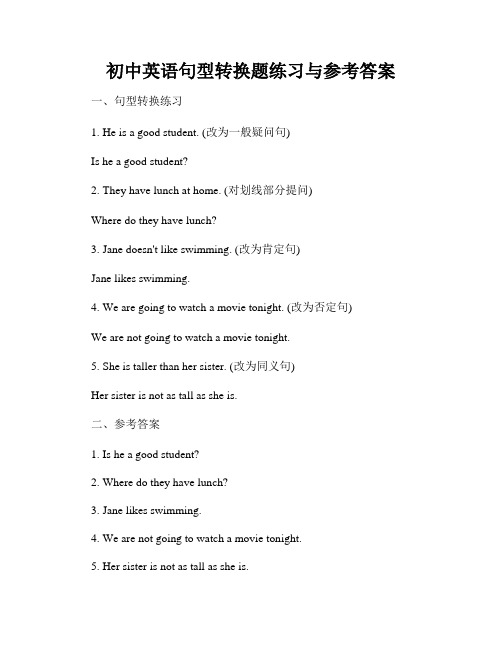
初中英语句型转换题练习与参考答案
一、句型转换练习
1. He is a good student. (改为一般疑问句)
Is he a good student?
2. They have lunch at home. (对划线部分提问)
Where do they have lunch?
3. Jane doesn't like swimming. (改为肯定句)
Jane likes swimming.
4. We are going to watch a movie tonight. (改为否定句)
We are not going to watch a movie tonight.
5. She is taller than her sister. (改为同义句)
Her sister is not as tall as she is.
二、参考答案
1. Is he a good student?
2. Where do they have lunch?
3. Jane likes swimming.
4. We are not going to watch a movie tonight.
5. Her sister is not as tall as she is.
注意:以上参考答案仅为参考,实际上可能会有多种正确的表达方式。
句型转换题的关键在于理解句子的结构和语法规则,根据题意进行必要的改变。
希望以上内容对你有所帮助。
初一英语句型转换

初一英语句型转换的专项练习练习一:肯定句变否定句1.He is a student.He is not a student.2.They like playing football.They don't like playing football.3.She can sing a song.She can't sing a song.练习二:陈述句变一般疑问句1.I am from China.Are you from China?2.He has a new bike.Does he have a new bike?3.They are watching TV.Are they watching TV?练习三:划线部分提问1.The book is on the desk. (划线部分为on the desk)Where is the book?2.He is my brother. (划线部分为my brother)Who is he?3.They are five yuan. (划线部分为five yuan)How much are they?— 1 —练习四:同义句转换1.It's time for lunch.It's time to have lunch.2.He is tall and thin.He is a tall and thin man.3.What's your name?May I know your name?以上是一些初一英语句型转换的专项练习,包括肯定句变否定句、陈述句变一般疑问句、划线部分提问和同义句转换等。
通过这些练习,你可以更好地掌握英语句型的变换规律,提高你的英语水平。
记得多做练习,多思考,相信你会越来越擅长英语句型转换的!— 2 —。
句型转换习题及答案
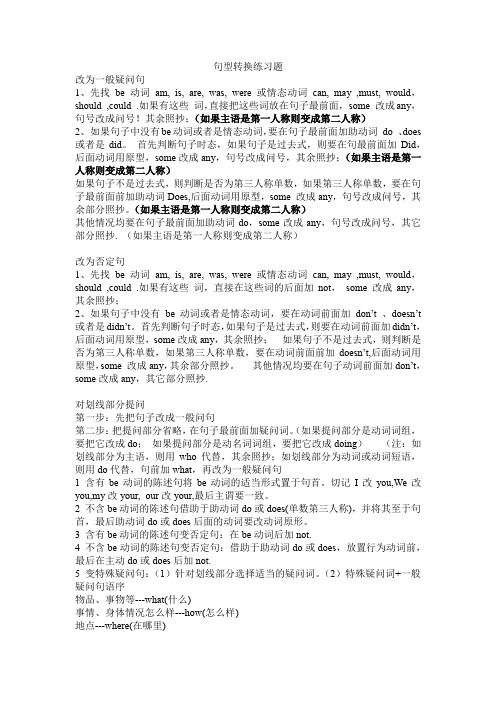
句型转换练习题改为一般疑问句1、先找be动词am, is, are, was, were或情态动词can, may ,must, would,should ,could .如果有这些词,直接把这些词放在句子最前面,some 改成any,句号改成问号!其余照抄;(如果主语是第一人称则变成第二人称)2、如果句子中没有be动词或者是情态动词,要在句子最前面加助动词do 、does 或者是did。
首先判断句子时态,如果句子是过去式,则要在句最前面加Did,后面动词用原型,some改成any,句号改成问号,其余照抄;(如果主语是第一人称则变成第二人称)如果句子不是过去式,则判断是否为第三人称单数,如果第三人称单数,要在句子最前面前加助动词Does,后面动词用原型,some 改成any,句号改成问号,其余部分照抄。
(如果主语是第一人称则变成第二人称)其他情况均要在句子最前面加助动词do,some改成any,句号改成问号,其它部分照抄. (如果主语是第一人称则变成第二人称)改为否定句1、先找be动词am, is, are, was, were或情态动词can, may ,must, would,should ,could .如果有这些词,直接在这些词的后面加not,some 改成any,其余照抄;2、如果句子中没有be动词或者是情态动词,要在动词前面加don’t、doesn’t 或者是didn’t。
首先判断句子时态,如果句子是过去式,则要在动词前面加didn’t,后面动词用原型,some改成any,其余照抄;如果句子不是过去式,则判断是否为第三人称单数,如果第三人称单数,要在动词前面前加doesn’t,后面动词用原型,some 改成any,其余部分照抄。
其他情况均要在句子动词前面加don’t,some改成any,其它部分照抄.对划线部分提问第一步:先把句子改成一般问句第二步:把提问部分省略,在句子最前面加疑问词。
六年级英语句型转换专项训练
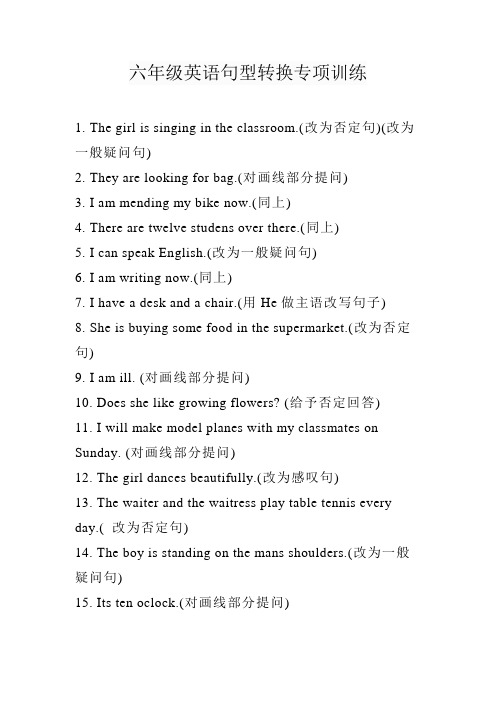
六年级英语句型转换专项训练
1. The girl is singing in the classroom.(改为否定句)(改为一般疑问句)
2. They are looking for bag.(对画线部分提问)
3. I am mending my bike now.(同上)
4. There are twelve studens over there.(同上)
5. I can speak English.(改为一般疑问句)
6. I am writing now.(同上)
7. I have a desk and a chair.(用He做主语改写句子)
8. She is buying some food in the supermarket.(改为否定句)
9. I am ill. (对画线部分提问)
10. Does she like growing flowers? (给予否定回答)
11. I will make model planes with my classmates on Sunday. (对画线部分提问)
12. The girl dances beautifully.(改为感叹句)
13. The waiter and the waitress play table tennis every day.( 改为否定句)
14. The boy is standing on the mans shoulders.(改为一般疑问句)
15. Its ten oclock.(对画线部分提问)。
各类句式转换练习题
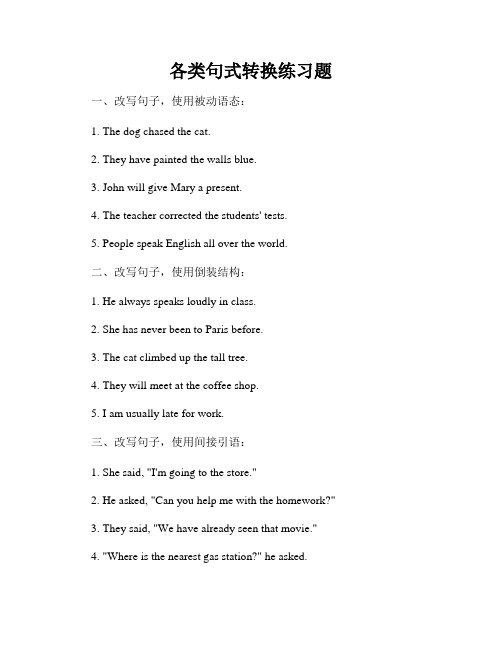
各类句式转换练习题一、改写句子,使用被动语态:1. The dog chased the cat.2. They have painted the walls blue.3. John will give Mary a present.4. The teacher corrected the students' tests.5. People speak English all over the world.二、改写句子,使用倒装结构:1. He always speaks loudly in class.2. She has never been to Paris before.3. The cat climbed up the tall tree.4. They will meet at the coffee shop.5. I am usually late for work.三、改写句子,使用间接引语:1. She said, "I'm going to the store."2. He asked, "Can you help me with the homework?"3. They said, "We have already seen that movie."4. "Where is the nearest gas station?" he asked.5. "Did you finish your homework?" she asked.四、改写句子,使用同义词替换:1. The car is expensive.2. I enjoy playing basketball.3. The weather is nice today.4. She is a talented musician.5. He is a successful businessman.五、改写句子,使用比较级形式:1. The book is interesting.2. This city is crowded.3. She is a good singer.4. The movie was exciting.5. He is a strong swimmer.六、改写句子,使用虚拟语气:1. I wish I could speak French fluently.2. If I won the lottery, I would buy a big house.3. She suggested going to the beach for a picnic.4. He requested that she bring him a cup of coffee.5. If it hadn't rained, we would have gone hiking.七、改写句子,使用定语从句:1. The boy who is wearing a red hat is my neighbor.2. I visited the city where I was born.3. The book that I'm reading is really interesting.4. The car that he bought is very expensive.5. She introduced me to her friend who is a famous writer.八、改写句子,使用强调句式:1. I invited John to the party.2. She bought a new dress for the event.3. He will take the train to the airport.4. They have built a new school in the neighborhood.5. We should study hard for the exam.以上就是各类句式转换练习题的内容,通过以上练习可以帮助提升句子变换的能力,丰富语言表达方式。
英语句型转换练习题及答案

英语句型转换练习题及答案一、改写句子 (Rewrite the sentences)1. She is too young to watch that movie.→ The movie is not suitable for her age.2. They have been friends for five years.→ They have known each other for five years.3. He didn't study, so he failed the test.→ If he had studied, he wouldn't have failed the test. 4. The concert was canceled due to bad weather.→ Because of the bad weather, the concert was canceled.5. It’s quite possible that she forgot about the meeting.→ She might have forgot ten about the meeting.6. Shall we go to the beach or stay at home?→ What do you think, beach or home?7. He speaks English as fluently as a native speaker.→ His English is as fluent as a native speaker.8. I have never seen such a beautiful sunset before.→ It's the most beautiful sunset I have ever seen.9. "Could you please turn down the music?" she asked.→ She asked if he could turn down the music.10. She plays the piano better than anyone else in the class.→ Nobody in the class pla ys the piano as well as she does.二、选择合适的句型补全对话 (Choose the appropriate sentence to complete the dialogue)A: Can I help you with anything?B: __3__A: Certainly. What seems to be the problem?B: I can't find my wallet anywhere. I think I lost it.A: __5__B: Yes, I was shopping in the mall earlier. I think it might have fallen out of my pocket.A: __2__B: No, I didn't. I'll check again just in case.A: __1__B: Thank you, I appreciate it.A: __4__1. Let me know if you find it.2. Have you retraced your steps?3. Yes, I need your help.4. I hope you find it soon.5. Where were you when you last had it?三、根据提示完成句子 (Complete the sentences according to the prompts)1. My sister prefers reading novels ______ watching movies. (to)2. The teacher asked the students not ______ in class. (to talk)3. If I ______ you, I would take the job offer. (were)4. Eating a balanced diet can ______ your overall health. (improve)5. Mary has been playing the piano ______ she was five years old. (since)6. The weather was so hot that we ______ to go swimming. (decide)7. I visited London last year, ______ I had a great time. (where)8. It is important ______ a positive attitude towards challenges. (to maintain)9. ______, I don't agree with his opinion. (personally)10. Can you please ______ the window? It's getting too cold. (close)答案:一、改写句子 (Rewrite the sentences)1. The movie is not suitable for her age.2. They have known each other for five years.3. If he had studied, he wouldn't have failed the test.4. Because of the bad weather, the concert was canceled.5. She might have forgotten about the meeting.6. What do you think, beach or home?7. His English is as fluent as a native speaker.8. It's the most beautiful sunset I have ever seen.9. She asked if he could turn down the music.10. Nobody in the class plays the piano as well as she does.二、选择合适的句型补全对话 (Choose the appropriate sentence to complete the dialogue)B: Yes, I need your help.A: Have you retraced your steps?B: No, I didn't. I'll check again just in case.A: Where were you when you last had it?B: Yes, I was shopping in the mall earlier. I think it might have fallen out of my pocket.A: Let me know if you find it.B: Thank you, I appreciate it.A: I hope you find it soon.三、根据提示完成句子 (Complete the sentences according to the prompts)1. My sister prefers reading novels to watching movies.2. The teacher asked the students not to talk in class.3. If I were you, I would take the job offer.4. Eating a balanced diet can improve your overall health.5. Mary has been playing the piano since she was five years old.6. The weather was so hot that we decided to go swimming.7. I visited London last year, where I had a great time.8. It is important to maintain a positive attitude towards challenges.9. Personally, I don't agree with his opinion.10. Can you please close the window? It's getting too cold.。
小学句型转换练习题
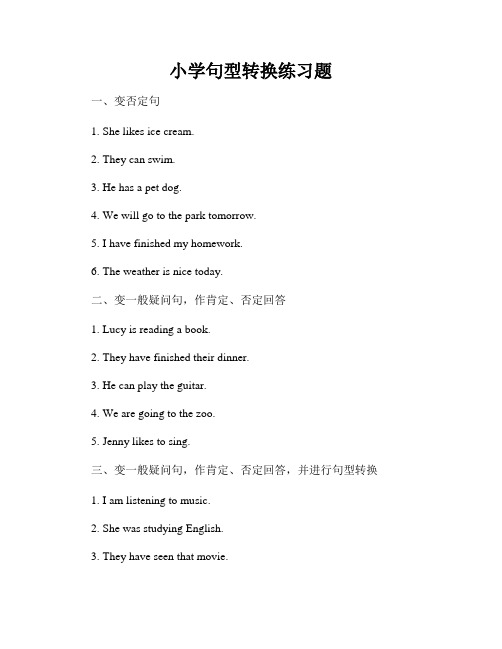
小学句型转换练习题一、变否定句1. She likes ice cream.2. They can swim.3. He has a pet dog.4. We will go to the park tomorrow.5. I have finished my homework.6. The weather is nice today.二、变一般疑问句,作肯定、否定回答1. Lucy is reading a book.2. They have finished their dinner.3. He can play the guitar.4. We are going to the zoo.5. Jenny likes to sing.三、变一般疑问句,作肯定、否定回答,并进行句型转换1. I am listening to music.2. She was studying English.3. They have seen that movie.4. He will visit his grandparents.5. We can speak French.四、变选择疑问句1. Lisa likes chocolate ______ vanilla ice cream?2. ________ he go to the park or the beach?3. ________ your sister play the piano or the violin?4. ________ they stay at home or go shopping?5. ________ we have dinner now or later?五、完成对话A: What did you do yesterday?B: I played soccer with my friends.A: __________ you have fun?B: Yes, I __________.六、改写句子1. I have a red ball.2. They were playing in the garden.3. She will sing a song at the concert.4. We can see the stars at night.5. He likes to watch cartoons.七、连词成句1. likes, Sam, ice cream.2. my, has, brother, dog, a.3. are, you, doing, what?4. can, read, I, books.5. homework, my, doing, I, am.八、翻译句子1. 我们明天要去海边。
英语句型转换

英语句型转换一、将下列句子改为否定句。
1、He takes some pictures every day.他每天拍一些照片He doesn't take photos every day。
他每天都不拍照片2、It’s cheap enough.够便宜的了It's not cheap这一点不便宜的3、She gave her brother some tapes about folk music.她给她哥哥对民间音乐磁带She didn't give her brother a tape of folk music.她没给她哥哥民间音乐磁带4.This is the first time we come to Australia. 这是我们第一次来澳大利亚This is not the first time we come to Australia.这不是我们第一次来澳大利亚5、There are a lot of lovely animals there.那儿有许多可爱的动物There are no lovely animals there。
那儿没有可爱的动物。
6、My mother will take me to Beijing for my holiday next Sunday.我妈妈要带我去北京,下星期日我的假期My mother doesn't take me to Beijing. I won't have a holiday next Sunday。
我妈妈不带我去北京,下星期日我没有假期。
7、You can find many tall trees in the picture of the park.你可以在公园的照片发现有许多高大的树木.You don't find many tall trees in the Park Photos你在公园的照片没有发现有许多高大的树木8、I am listening to music.我在听音乐I didn't listen to music。
小学英语小升初专题训练-句型转换专项练习 50题(含答案)
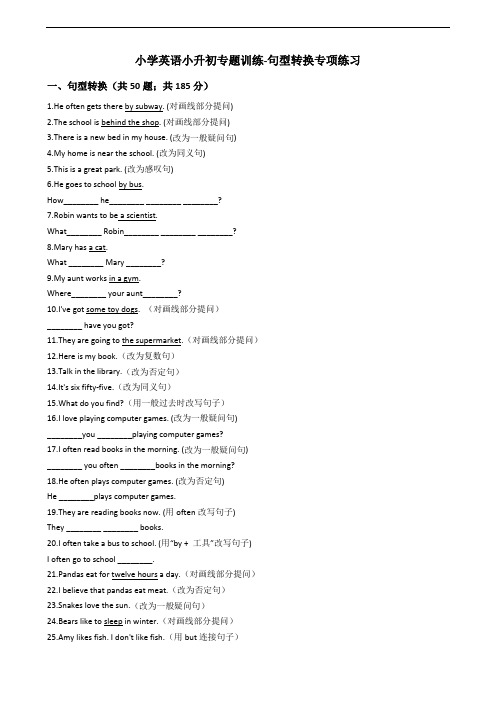
小学英语小升初专题训练-句型转换专项练习一、句型转换(共50题;共185分)1.He often gets there by subway. (对画线部分提问)2.The school is behind the shop. (对画线部分提问)3.There is a new bed in my house. (改为一般疑问句)4.My home is near the school. (改为同义句)5.This is a great park. (改为感叹句)6.He goes to school by bus.How________ he________ ________ ________?7.Robin wants to be a scientist.What________ Robin________ ________ ________?8.Mary has a cat.What ________ Mary ________?9.My aunt works in a gym.Where________ your aunt________?10.I've got some toy dogs. (对画线部分提问)________ have you got?11.They are going to the supermarket.(对画线部分提问)12.Here is my book.(改为复数句)13.Talk in the library.(改为否定句)14.It's six fifty-five.(改为同义句)15.What do you find?(用一般过去时改写句子)16.I love playing computer games. (改为一般疑问句)________you ________playing computer games?17.I often read books in the morning. (改为一般疑问句)________ you often ________books in the morning?18.He often plays computer games. (改为否定句)He ________plays computer games.19.They are reading books now. (用often改写句子)They ________ ________ books.20.I often take a bus to school. (用“by + 工具”改写句子)I often go to school ________.21.Pandas eat for twelve hours a day.(对画线部分提问)22.I believe that pandas eat meat.(改为否定句)23.Snakes love the sun.(改为一般疑问句)24.Bears like to sleep in winter.(对画线部分提问)25.Amy likes fish. I don't like fish.(用but连接句子)26.Have you got a toy car, Jim?(作否定回答)27.I've got a beautiful kite. I can't fly it.(用but连接成一句话)28.Have you got a stamp from China? (作否定回答)No, ________ ________.29.There's a letter for you.(改为一般疑问句)________ ________ a letter for me?30.I have got some stamps from Canada. (改为一般疑问句)________ you got ________ stamps from Canada?31.What's that? (改为复数句)What ________ ________?32.He read a book yesterday evening. (改为否定句)He ________ ________ ________a book yesterday evening.33.I can sing this song now.(用one year ago改写句子)I ________ ________this song one year ago.34.Jim visited the Summer Palace last year.(改为否定句)Jim ________ ________the Summer Palace last year.35.She saw many interesting things in Shanghai. (改成一般疑问句并作否定回答)________ she ________many interesting things in Shanghai? No, she ________. 36.I was a student five years ago. (改为一般疑问句,并作否定回答)—________ ________ a student five years ago?—________, I ________.37.My father used the telephone at home to call people.(改为一般疑问句)________ your father ________ the telephone at home to call people?38.She saw some cool cars in the shop. (改为一般疑问句)________she________ ________ cool cars in the shop?39.I went to the Great Wall for the holiday. (对画线部分提问)________ ________ you go for the holiday?40.It was great fun. (改为感叹句)________ ________ ________ it was!41.Did you go fishing last Sunday? (改成陈述句)________ ________ fishing last Sunday.42.Mike goes to school on foot.(就画线部分提问)43.John is sad.(写出问句)44.John likes reading books.(改为一般疑问句)45.My mother works in a zoo.(就画线部分提问)46.We can go to the zoo today.(否定句)47.My father is a teacher.(就画线部分提问)48.John often does sports on the weekend.(改为否定句)49.He lives in China.(改为一般疑问句)50.Is your father a teacher? (肯定回答)答案解析部分一、句型转换1.【答案】How does he often get there?【考点】句型转换【解析】【分析】句意:他经常乘地铁到那里。
小学英语句型转换专项练习

句型转换方法归纳一、改为一般疑问句有be动词1、找找be动词 am, is, are,;2、提找到be动词,直接把be动词提在句子最前面;3、换把相关词换掉,some 换成any,I换成youI 换成you之后,am要换成are,we换成you, my换成your,句号换成问号;其余照抄;例:Amy is a worker in factory.I am good at cooking.没有be动词1、加加助动词 do或does到句首,除第三人称单数时加does,其余一律加do;2、换把相关词换掉,some 换成any,I换成youI 换成you之后,am要换成are,we换成you, my换成your,句号换成问号,动词换成原形;其余照抄;例:They like basketball.She likes playing piano.二、改为否定句有be动词1、找be动词,找到be动词,直接在be动词的后面加not, some 改成any,其余照抄;例:I’m going to see a film.There is many books .没有be动词1、找动词2、在动词前面直接加don’t 或doesn’t,除第三人称单数时加doesn’t,其余一律加don’t ,some改成any,动词换成原形,其余部分照抄;例:I like apple.He takes some pictures every day.三、对划线部分提问第一步:先把句子改成一般疑问句第二步:改提问部分1.看看疑问部分是什么内容;2.找找相应的疑问词,相应的疑问词如下:What →什么How →怎么样Where →什么地方When →什么时候How many →多少How much →多少钱例:She is nice.He likes drawing.I eat some bread.注意:如果提问部分是动词词组,加疑问词之后,还要在提问部分原来的地方加do 例:We are going to take a trip.一,对下列句子中划线部分提问1,The deepest part最深的部分of the water is near Japan.______________________________________________________________ 2,My trip to Xi’an is great.______________________________________________________________ 3,I’m looking for a dress.______________________________________________________________ 4,I saw many animals in Beijing Zoo.______________________________________________________________ 5,I often help my grandfather on the farm.______________________________________________________________ 6,I am from Australia.______________________________________________________________ 7,My new pencil-box is about ten yuan.______________________________________________________________ 8,The name of the book is Sleeping Beauty.______________________________________________________________ 9,He came to visit China two days ago.______________________________________________________________ 10,These sneakers are 280 yuan.______________________________________________________________ 11,I get up at 6 o’clock every morning.______________________________________________________________ 12,Tom saw many places of interest名胜古迹in that old city.______________________________________________________________ 13,I come here by train.______________________________________________________________ 14,We are going to buy tomorrow’s air tickets.______________________________________________________________ 15,My father works in Africa.______________________________________________________________二,把下列句子变为一般疑问句:1. I am good at swimming.______________________________________________________ 2. Mike is a student in Grade Six.______________________________________________________ 3. Tom likes listening to the music______________________________________________________ come to visit China.______________________________________________________ 5. They like making the cakes.______________________________________________________ 10. Jim helps his grandfather on the farm after school.______________________________________________________ 11. He wants to be an actor演员in the future将来.______________________________________________________ play basketball on Sundays.______________________________________________________ 15. The girls are singing in the classroom.______________________________________________________ 17. The little boy is standing on the man's shoulders.______________________________________________________ is some fruit juice in the glass.______________________________________________________ 三,将下列句子变为否定句:takes some pictures every day.______________________________________________________ me your library card, please.______________________________________________________ are a lot of lovely animals there.______________________________________________________。
六年级英语上册句型转换专项真题

六年级英语上册句型转换专项真题班级:_____________ 姓名:_____________【句型转换】1. 按要求写句子。
[1]My mother goes to the park every week.(用 next week改写)[2]Mr Brown lives in the city.(改为一般疑问句)[3]He works in a car factory.(对句子主题意思提问)[4]What does your mother do? (写出其同义句)[5]She is going to buy word books tomorrow.(对句子主题意思提问)2. 句型转换。
1.I never go to the doctor.(改为一般疑问句)2.Lingling often plays with dolls.(对句子主题意思提问)3.Does you brother eat dumplings?(做肯定回答)3. 句型转换。
1. We went to visit Sanya .(就主题意思提问)______ ______ you ______ to visit ?2. Did you have a good time ?(肯定句)I ______ a good time .3. Were you at home yesterday ?(同义句)Were you ______ yesterday ?4. I was born on January lst , 1992 .(就主题意思提问)______ ______ you ______ ?5. Lisa and her parents saw some drawings on the cave wall .(否定句)Lisa and her parents ______ ______ ______ drawings on the cave wall .6. I enjoyed the lessons I learned .(就主题意思提问)______ ______ ______ you ______ ?7. Excuse me , where’s the post office ?(同义句)Excuse me , ______ can I ______ to the post office ?8. Did you play games yesterday afternoon ?(否定回答)______ , I ______ .9. She can sing .(用dance改为选择疑问句)Can she sing ______ dance ?4. 按要求完成下列各题。
(完整版)英语句型转换专项练习

英语句型转换专项练习①:一般疑问句陈述句改一般疑问句方法:①把be动词(am is are)和情态动词(can, may, must..。
) 提前,放到句首,其它照写.遇I/we→you, my→your。
Some→any。
句号→问号(?)例如:陈述句: They are in the park。
He can play the guitar。
.一般疑问句: Are they in the park? Can he play the guitar?练习:把下列句子变成一般疑问句1. I am listening to music。
2。
Mike is a student.3。
Mary can clean the classroom.4。
They are in the zoo。
5. There are some flowers in the vase。
6. This is my sister。
7。
We are sweeping the floor。
②借助助动词do/does.第三人称单数用does,其余人称用do,放到句首,其他照写。
特别记住:前面用does,后面的动词一定还原成原形。
遇I/we→you, my→your。
Some→any。
句号→问号(?)例如:陈述句: I like the ducks。
He likes the dogs。
一般疑问句:Do you like the ducks? Does he like the dogs?练习:把下列句子改为一般疑问句.1。
We need some masks.2。
They like making the puppet。
3。
Su Hai and Su Yang live in a new house。
4. I put a book on my head.5。
They sing “In the classroom” together.6. We play basketball on Sundays.7. Tom likes listening to music.8。
句型转换练习

句型转换练习一、主动语态转被动语态1. 原句:Tom writes a letter.被动语态:A letter is written by Tom.3. 原句:They build a bridge.被动语态:A bridge is built by them.4. 原句:She sang a beautiful song.被动语态:A beautiful song was sung by her.5. 原句:We grow vegetables in the garden.被动语态:Vegetables are grown in the garden by us.二、宾语从句转为简单句1. 原句:He said that he was tired.简单句:He said he was tired.3. 原句:She told me that she loved me.简单句:She told me she loved me.5. 原句:We heard that the concert was canceled. 简单句:We heard the concert was canceled.三、陈述句转疑问句1. 原句:She is studying English.疑问句:Is she studying English?2. 原句:They have finished their homework.疑问句:Have they finished their homework?4. 原句:They like playing basketball.疑问句:Do they like playing basketball?5. 原句:She has lived here for five years.疑问句:Has she lived here for five years?四、选择疑问句转陈述句1. 原句:Do you like tea or coffee?陈述句:You like tea or coffee.2. 原句:Is he going to the party or staying home? 陈述句:He is going to the party or staying home.3. 原句:Are they studying Chinese or Japanese? 陈述句:They are studying Chinese or Japanese.4. 原句:Did she buy the blue or red dress?陈述句:She bought the blue or red dress.5. 原句:Can you swim or dive?陈述句:You can swim or dive.五、简单句转复合句1. 原句:I like reading books.复合句:I like reading books because they provide knowledge and entertainment.2. 原句:He plays tennis well.复合句:He plays tennis well, which is his favorite sport.3. 原句:She studies hard.复合句:She studies hard so that she can get good grades.4. 原句:They go to the park every weekend.复合句:They go to the park every weekend, where they enjoy nature and relax.5. 原句:We eat breakfast together.复合句:We eat breakfast together before starting our day.。
小学英语句型转换练习题

小学英语句型转换练习题一、陈述句与特殊疑问句转换1. She is playing the piano.→ What is she doing?2. They are eating ice cream.→ What are they doing?3. He likes basketball.→ What does he like?4. We have a test tomorrow.→ When do we have a test?5. Amy has a cute dog.→ What does Amy have?二、一般疑问句与特殊疑问句转换1. You can swim, can't you?→ Can you swim?2. They have finished their homework, haven't they?→ Have they finished their homework?3. She is going to the party, isn't she?→ Is she going to the party?4. He was reading a book, wasn't he?→ Was he reading a book?5. We have seen the movie, haven't we?→ Have we seen the movie?三、肯定句与否定句转换1. She likes apples.→ She doesn't like apples.2. They can skate.→ They can't skate.3. He will go to school tomorrow.→ He won't go to school tomorrow.4. We had lunch at the restaurant.→ We didn't have lunch at the restaurant.5. I am doing my homework.→ I am not doing my homework.四、选择疑问句与特殊疑问句转换1. Is he going to the park or the zoo?→ Where is he going?2. Does she want an apple or an orange?→ What does she want?3. Did they watch a movie or play games?→ What did they do?4. Are you going to the party or staying at home?→ What are you doing?5. Will they have pizza or pasta for dinner?→ What will they have for dinner?五、改写句子类型1. He is running fast. (改为感叹句)→ How fast he is running!2. They are playing soccer. (改为一般疑问句)→ Are they playing soccer?3. She plays the guitar every day. (改为否定句)→ She doesn't play the guitar every day.4. We went to the beach last summer. (改为特殊疑问句)→ When did we go to the beach?5. I will help you with your homework. (改为选择疑问句)→ Will I help you with your homework or not?六、完成对话A: Hello, can I help you?B: Yes, I'm looking for a book about science.A: (1) ________________?B: I need it for my science project.A: (2) ________________?B: Sure, I have a library card.A: Great. (3) ________________?B: Hmm, I'm not sure. Can you recommend a popular one?A: (4) ________________. It's very informative and easy to understand. B: That sounds perfect. Thank you!A: (5) ________________.B: Bye!(1) What are you looking for?(2) Do you have a library card?(3) Do you know any specific book?(4) I recommend "Science Explained".(5) You're welcome.。
句型转换-英语语法专项训练

句型转换一、句型转换(本大题共40小题,共80.0分)1.The sunshine is really beautiful.(改为感叹句)______ the sunshine is!【答案】How beautiful【解析】答案:How beautiful.英语中的感叹句要由what和how来引导,其句型是:How+形容词/副词+主语+谓语+其他!What+(a/an)+形容词+名词+主语+谓语+其他!根据所给的单词,形容词是beautiful,主语是The sunshine,应用how来感叹,故填写:How beautiful.阳光真的很美丽.阳光多么美丽啊!1、what修饰名词或名词短语,有以下两种形式:1.What+a(an)+(形容词)+单数可数名词+主语+谓语!或是:What+名词词组+主语+谓语!2.What+(形容词)+可数名词复数或不可数名词+主语+谓语!2、How引导的感叹句.how用来修饰形容词、副词或动词.其结构是:How+形容词(副词)+主语+谓语!2.Tom has been to the US before.(改为否定句)Tom ______ to the US before.【答案】hasn't been【解析】答案:hasn't been.这里是现在完成时,在has后加上not构成否定句,故答案是hasn't been.汤姆以前去过美国.汤姆以前没有去过美国.含有be动词,情态动词或者助动词have/has的句子转化成否定时在其后面加上not,一般实意动词的否定式,通常应根据不同时态和人称在实意动词之前加don't,doesn't,didn't 等.3.Fiona didn't stay at home last Sunday.She went shopping,instead.(合并为一句)Fiona went shopping last Sunday ______ staying at home.【答案】instead of【解析】答案:instead of.结合She went shopping,instead可知是表达Fiona周日没有待在家里而是去购物了,以及下文的staying at home用instead of代替…,而不是…,故答案是instead of.Fiona周日没有待在家里,她去购物了.Fiona周日没有待在家里而是去购物了stead是个副词,是代替、顶替的意思.instead常用在句末,说明被代替的人或事物.另外,instead之后可带of,构成"instead of"短语,意思也是"代替,顶替",但instead of后面必须加上所被代替的人或事.4.Sam visits his grandfather every week?(改为一般疑问句)______ Sam ______ his grandfather every week?【答案】Does;visit【解析】答案:Does,visit.visit是实意动词,这里是一般现在时,主语Sam,故借助于助动词does构成一般疑问句,后加动词原形visit,故答案是Does,visit.山姆每周都去看望爷爷.山姆每周都去看望爷爷吗?一、含有be动词(am/is/are/was/were)动词的一般疑问句,通常把be动词调到句首.二、含有情态动词(can/may/must/could)的一般疑问句,把情态动词调到句首.三、句子里没有be动词、助动词、情态动词等,就需要加助动词do,does,、did(过去式)来构成疑问句,加上这些助动词后,句子中谓语动词必须用原形.其句型为:Do/Does/did+主语+动词原形+其它?5.Emma helped the old lady with her housework once a week last year.(对画线部分提问)______ did Emma help the old lady with her housework?【答案】How often【解析】答案:How often.划线部分表达的是频率,提问用疑问词how often多久一次,故答案是How often.艾玛去年帮助这个老人一周做一次家务.艾玛去年多久帮助这个老人做一次家务?对划线部分提问要分析划线部分在句子中的成分,即可找出恰当的特殊疑问词.疑问词后一般疑问句语序.6.不要忘了提醒我日期和地点(完成译句)Don't ______ remind me of the date and place.【答案】forget to【解析】答案:forget to.表示忘了去做某事用forget to do sth,指这件事还没做,这里是否定祈使句,don't+动词原形,故答案是forget toDon't forget to remind me of the date and place.做这类题型,首先根据所给汉语明确句子所要考查的单词或短语的拼写,再结合相关语法知识对单词或短语做出形式上的变化7.I don't like going on a picnic.Peter doesn't,either.(合并为一句)______ Peter ______ I like going on a picnic.【答案】Neither;nor【解析】答案:Neither,nor.结合上文可知是两者都不喜欢,故用neither…nor…表示既不…也不…,故答案是Neither,nor.我不喜欢去野餐,皮特也不喜欢.皮特和我都不喜欢去野餐.neither…nor谓语动词的单复数用就近原则恶劣的天气和艰苦的条件都不能改变她在那里教书的想法.Neither bad weather nor the poor condition could change her mind to teach here.Jim和Tom都不打算开车去买菜.Neither Jim nor Tom is going to buy vegetables by car.我父母和姐姐中午都不在家吃饭.Neither my parents nor my sister has dinner at home.8.You can't play the guitar in the classroom.(改为祈使句)____________the guitar in the classroom.【答案】Don't;play【解析】答案:Don't play.结合上文的含义是说不能弹吉他,故用否定祈使句don't+动词原形,故答案是Don't play.你不能在教室弹吉他.不要在教室弹吉他.否定的祈使句(1)Don't+动词原形Don't stand up.别站起来. Don't be careless.别粗心.Don't let them play with fire.别让他们玩火.(2)Let型的否定式有两种:"Don't+let+宾语+动词原形+其它成分"和"Let+宾语+not+动词原形+其它成分".Don't let him go./Let him not go.别让他走. Let them not play with fire.别让他们玩火.(3)no开头,用来表示禁止性的祈使句.No smoking!禁止吸烟!No fishing!禁止钓鱼!9.Mr Smith is a very kind man.(改为感叹句)______ ______ kind man Mr Smith is!【答案】What;a【解析】答案:What a.英语中的感叹句要由what和how来引导,其句型是:How+形容词/副词+主语+谓语+其他!What+(a/an)+形容词+名词+主语+谓语+其他!根据所给的单词,形容词是kind,修饰中心词可数名词man,应用what来感叹,kind是以辅音音素[k]开头,故用a,故填写:What a.斯密斯先生是一个友善的人.斯密斯先生是一位多么友善的人啊!本题考查的是学生们对于英语中what和how引导的感叹句句型的掌握,要求他们要牢记其句型:How+形容词/副词+主语+谓语+其他!!What+(a/an)+形容词+名词+主语+谓语+其他!10.Does your PE teacher teach you Chinese kung fu?(改为被动语态)______ you______ Chinese kung fu by your PE teacher?【答案】Are;taught【解析】考查被动语态.由Does第三人称单数.可知,一般现在时态的被动语态.结构是is/am/are+动词的过去分词.主语you.用are.teach的过去分词是taught教.故答案是:Are;taught.--你的体育老师教你功夫吗?--你被你的体育老师教过功夫吗?被动语态表示主语是动作的承受者,被动语态由"be动词+及物动词的过去分词"构成,be动词的单复数要与主语的单复数保持一致,还要注意时态及过去分词的变法.11.Telling the truth is a very honest act.(改为感叹句)____________ honest act telling the truth is!【答案】What;an【解析】考查感叹句.感叹句可以用what a/an+形容词+名词+主语+谓语.这里名词是act行为.主语telling the truth说实话.谓语is.用what.形容词honest,以元音音素/ɔ/开头,用an修饰.故答案是:What an.--说实话是一种非常诚实的行为.--说实话是多么诚实的行为啊!叹句可以用how或what引导,两者有一定区别,要掌握该知识点,然后结合语境选择正确形式,完成试题.12.She did chores with her parents.(改为一般句)______ she ______ chores with her parents?【答案】Did;do【解析】答案:Did do分析原句是一个一般过去时的陈述句,意思是她和父母一起做家务了,变一般疑问句时将助动词did提前大写,后接动词原形,即do chores,故得出答案她和父母一起做家务了.她和她父母一起做家务了吗?解答此类试题时,务必充分理解上下文的语境和逻辑关系,根据要求准确作答.13.Though the earthquake destroyed many houses,people didn't lose hope.(改为被动语态)Though many houses______by the earthquake,people didn't lose hope.【答案】were destroyed【解析】本题考查被动语态.题干是一般过去式,改为被动语态也应是一般过去时的被动语态.be+done构成被动语态,主语是many houses,be动词用were.故答案为:were destroyed.句意:虽然地震毁了大量的房子,但是人们没有失去希望.虽然大量的房子被地震毁了,但是人们没有失去希望.本题考查一般过去时的被动语态,解答本题的关键是掌握其构成was/were+done.14.Our school is beautiful.(改为感叹句)______our school is!【答案】How beautiful【解析】本题考查感叹句.How+形容词/副词+主语+谓语!根据our school is可知,是主语+谓语,所以应用how引导,how后面加形容词.故答案为:How beautiful.句意:我们的学校是美丽的.我们的学校好美丽啊!本题考查how引导的感叹句,解答本题的关键是掌握how引导的感叹句的结构.15.It is important for kids to imagine freely.(改为感叹句)______ it is for kids to imagine freely!【答案】How important【解析】答案:How important.英语中的感叹句要由what和how来引导,其句型是:How+形容词/副词+主语+谓语+其他!What+(a/an)+形容词+名词+主语+谓语+其他!根据所给的单词,形容词是important,主语是it,应用how来感叹,故答案是How important.对于孩子来说自由想象是重要的.孩子们自由想象是多么的重要啊.本题考查的是学生们对于英语中what和how引导的感叹句句型的掌握,要求他们要牢记其句型:How+形容词/副词+主语+谓语+其他!!What+(a/an)+形容词+名词+主语+谓语+其他!16.It rained heavily yesterday morning.(改为感叹句)____________it rained yesterday morning!【答案】How;heavily【解析】答案:How heavily.英语中的感叹句要有what和how来引导,其句型是:How+形容词/副词+主语+谓语+其他!以及What+a/an+名词+主语+谓语+其他!根据所给的单词heavily是副词,应用how 来感叹副词heavily,故填写:How heavily.昨天早上雨下得很大.昨天早上的雨下得多么大啊!本题考查的是学生们对于英语中what和how引导的感叹句句型的掌握,要求他们要牢记其句型:How+形容词/副词+主语+谓语+其他!What+a/an+名词+主语+谓语+其他!17.He was listening to music at that lime yesterday.(改为否定句)He ______ to music at that time yesterday.【答案】wasn't listening【解析】答案:wasn't listening.句中含有be动词was,故后面加上not构成否定,故答案是wasn't listening.他昨天那个时候正在听音乐.他昨天那个时候不是在听音乐.含有be动词,情态动词或者助动词have/has的句子转化成否定时在其后面加上not,一般实意动词的否定式,通常应根据不同时态和人称在实意动词之前加don't,doesn't,didn't 等.18.The waiter took away the plates after we finished eating.(改为被动语态)The plates______away by the waiter after we finished eating.【答案】were taken【解析】答案:were taken.主语the plates是动词take的承受者,上文是一般过去时,故用一般过去时的被动语态was/were+过去分词,主语the plates,故were,故答案是were taken我们吃完之后服务生拿走了盘子.被动语态(passive voice)是动词的一种形式,用以说明主语与谓语动词之间的关系.英语的语态共有两种:主动语态和被动语态.主动语态表示主语是动作的执行者,被动语态表示主语是动作的承受者.被动语态是动词的一种特殊形式,一般来说,只有需要动作对象的及物动词才有被动语态.汉语往往用"被"、"受"、"给"等被动词来表示被动意义.被动语态由"助动词be+及物动词的过去分词"构成.被动语态的时态变化只改变be 的形式,过去分词部分不变.疑问式和否定式的变化也如此.19.You'd better take a camera with you.(改为否定句)You______ take a camera with you.【答案】had better not【解析】考查否定句.you'd better do sth你最好做某事.否定形式是you'd better not do sth 你最好不要做某事.you'd的完整形式是you had.故答案是:had better not.--你最好带个照相机.--你最好不要带照相机.考查否定句.通常是在be动词,情态动词后加not.一般现在时态,主语不是第三人称单数用don't,主语是第三人称单数用doesn't.一般过去时态用didn't.这里掌握固定搭配you'd better not do sth你最好不要做某事.20.You should take a tent with you.(对画线部分提问)______ you take with you ?【答案】What should【解析】考查划线部分提问.根据a tent一个帐篷,可知,对物提问用疑问词what什么,后跟一般疑问句,情态动词should提前.故答案是:What should.--你应该带个帐篷.--你应该带什么?对划线部分提问,要根据划线部分内容选择合适的疑问词,剩下的变为一般疑问句.注意区分疑问词的用法.会正确运用一般疑问句用法.21.Zhang Ming was six when he started to play table tennis.(对划线部分提问)______was Zhang Ming when he started to play table tennis?【答案】How old【解析】答案:How old 根据:six (对划线部分提问),可知应该是:对年龄提问,在英语中,对年龄提问,应该用how old,几岁,多大年龄.故答案为:How old.张明六岁时开始打乒乓球.张明几岁时开始打乒乓球?主要考查特殊疑问句的疑问词组,做此类题目,一定注意答语的句意,根据答语推测所要问的内容,然后选出所需要的疑问词或疑问词组.本题主要考查how old,对年龄提问!22.The little girl put her things on the floor.(改为一般疑问句)______the little girl______her things on the floor?【答案】Did;put【解析】答案:Did,put 分析原句得知,是一个含有实义动词的一般过去时的陈述句,变一般疑问句时,需要助动词did来帮忙,将之提到句首大写,后接主语,再加谓语动词的原形,故得出答案.小女孩把她的东西放在地板上.小女孩把她的东西放在地板上了吗?一般疑问句是疑问句的一种.它是指用yes(是)或no(否)来回答的句子.其结构是:系动词be/助动词/情态动词+主语+其他成分通常回答为:肯定:Yes,+主语+提问的助动词.否定:No,+主语+提问的助动词+not.23.The nurse must take good care of all the kids.(改为被动语态)All the kids__________________good care of______ the nurse.【答案】must;be;taken;by【解析】答案:must be taken by 分析原句是一个含有情态动词must的主动句,意思是护士必须照顾好所有的孩子,改为被动句时,即主语+情态动词+be+done,故用must be taken,后面的the nurse是动作的实施者,故用by,故答案是must be taken by护士必须照顾好所有的孩子.所有的孩子都必须得到护士的照顾.解答此类试题时,务必充分理解句子的含义和作答要求,同时考虑单词的适当形式,准确作答.24.句型转换,每空一词.They had an English party last Sunday.(改为否定句)They ______ an English party last Sunday.The reporter asked the girl,"Do you like your volunteer work on weekends?"(改为间接引语)The reporter asked the girl ______ she ______ her volunteer work on weekends.The girl with a flower in her hand is my sister.(改为含定语从句的复合句)The girl ______ a flower in her hand is my sister.Should I arrive on time or a little later if someone invites me to dinner?(改为同义句)Am I ______ ______ arrive on time or a little later if someone invites me to dinner?The students will learn the group dance on the school playground.(对画线部分提问)______ ______ the students learn the group dance?【答案】【小题1】didn't have【小题2】if/whether【小题3】liked【小题4】who/that has/holds【小题5】supposed【解析】81.答案:didn't have.含有一般动词的过去式改为否定句,只需在动词前加didn't,后跟动词原形have,故本题空格处填didn't have.82.答案if/whether;liked.一般疑问句作为宾语从句通常用if/whether来引导,主语为过去时,从句也应该用过去时,故本题空格处填if/whether;liked.83.答案:who/that has/holds.修饰名词为人的定语从句,关系词可以用who或that,在此句中做主语;从句中的谓语动词与先行词有关,时态不变用一般现在时,主语为三单,故本题使用拥有的单词has 或holds,故本题空格处填who/that has/holds.84.答案:supposed to.在英文中表示理应做某事可用be supposed to代替原句中的should.故本题空格处填supposed to.85:答案:Where will.对地点提问用疑问词where,后跟一般疑问句,助动词will直接提前,故本题空格处填Where will.81.上周日他们举行了一场英语聚会.上周日他们没有举行一场英语聚会.82.记者问女孩:"你喜欢你周末的志愿者工作吗?"记者问女孩她是否喜欢她周末的志愿者工作.83.那个手里有支花的女孩是我的姐姐.84.如果有人请我去吃饭我应该准点到还是晚点到?85.学生将在学校操场上学集体舞.学生将在哪个学校学集体舞?句型转换题是中考常见题型,它主要用来考查大家对句子结构的构成、变化的掌握及在行文中的运用等,类型繁多.变化过程中也要注意某些词语和人称的变化25.Boblikes pandas because they are very cute.(就句子画线部分提问)______ ______Bob like pandas?【答案】Why does【解析】答案:Why does.划线部分指的是原因,提问用疑问词why,后加一般疑问句语序,这里是一般现在时,主语三单,故借助于does、故答案是Why does.鲍勃喜欢熊猫因为他们非常可爱.鲍勃为什么喜欢熊猫?对划线部分提问要分析划线部分在句子中的成分,即可找出恰当的特殊疑问词,特殊疑问词之后紧跟一般疑问句.26.I spent thirty yuan on this ticket.(改为同义句)I ______ thirty yuan ______ this ticket.【答案】paid;for【解析】答案:paid,for.原句中的spend+金钱+on sth表示花多钱买某物,可以用pay+金钱+for sth来互换,原句是一般过去时,pay的过去式是paid,故答案是paid,for.我花了三十元买了这张票.spend,cost,take和pay的区别是历年中考试题的必考内容之一,虽然它们都可以表示"花费",但用法却不尽相同.spend的主语必须是人,常用于以下结构:(1)spend time/money on sth.在…上花费时间(金钱).(2)spend time/money (in)doing sth.花费时间(金钱)做某事.cost的主语是物或某种活动,还可以表示"值",常见用法如下:(1)sth.costs (sb.)+金钱,某物花了(某人)多少钱.(2)(doing)sth.costs(sb.)+时间,某物(做某事)花了(某人)多少时间.take后面常跟双宾语,It takes sb.+时间+to do sth.做某事花了某人多少时间.pay的基本用法是:(1)pay (sb.)money for sth.付钱(给某人)买….(2)pay for sth.付…的钱.(3)pay for sb.替某人付钱27.We can use the water we use for washing rice again to water flowers.(改为被动语态)The water we use for washing rice can______ again to water flowers.【答案】be used【解析】答案:be used.主动语态是含有情态动词can,所以采用含有情态动词的被动语态结构:情态动词+be+动词的过去分词,use的过去分词是used,故答案是be used.我们能再次用我们洗米的水来浇花.我们用来洗米的水能再次被用来浇花.本题考查含有情态动词的被动语态,平时熟练掌握其结构即可作答.28.I think that he is coming tomorrow.(改为否定句)I______think that he______coming tomorrow.【答案】don't;is【解析】答案:don't,is.主句的谓语动词是think,并且主句的主语是第一人称而且为一般现在时,从句的否定词一般要转移到主句上来,故I think换成I don't think,后面不变,答案是don't,is.我认为他明天会来我认为他明天不会来.本题考查的是宾语从句的否定句,注意否定转移的情况.29.His parents didn't catch his words at once.(改为被动语态)His words______ by his parents at once.【答案】weren't caught【解析】答案:weren't caught.原句didn't catch是一般过去时,一般过去时的被动语态的构成是was/were+动词过去分词,catch的过去式是caught,原句是否定式,故在was/were后加上not,根据words为复数,故答案是weren't caught他的父母没有立刻听到他的话.他的话没有立刻被他父母听到.本题考查一般过去时的被动语态,解答本题的关键是掌握其构成was/were+done.30.They have already visited the Science Museum.(改为一般疑问句)______they______ the Science Museum______?【答案】Have;visited;yet【解析】答案:Have…visited…yet.改一般疑问句:一提have;二改already改为yet;already用于肯定句,yet用于疑问句或否定句,故答案为:Have…visited…yet.他们已经参观过科学博物馆.他们参观过科学博物馆吗?此题考查现在完成时的一般疑问句,提前have/has 注意already改为yet即可31.It was very surprised that her brother found his wallet.(改为感叹句)____________her brother found his wallet!【答案】How;surprised【解析】答案:How surprised.由句子判断需用how修饰副词surprised,根据所学感叹句结构:How+副词+主语+谓语+其他!,所以答案为:How surprised.他的哥哥找到了钱包是很惊喜的.他的哥哥找到了钱包是多么惊喜啊!本题考查感叹句,做此类题的关键在于平时掌握感叹句结构.What (a/an)+形容词+名词+其他!How+形容词/副词+其他!32.There are some flowers in the garden.(改为一般疑问句)______ any flowers in the garden?【答案】Are there【解析】答案:Are there 含有be动词的句子改为一般疑问句时把be提前即可.故答案是Are there--在花园里有一些花.--花园里有一些花吗?含有系动词、情态动词和助动词的陈述句改为一般疑问句一般是把他们提前即可.没有这些词语的需要找助动词来帮忙.如含有实义动词的一般过去时和一般现在时,就需要借助于助动词:do/does/did.33.Lisa bought a souvenir in the Gift Shop yesterday.(改为否定句)Lisa______a souvenir in the Gift Shop yesterday.【答案】didn't buy【解析】答案:didn't buy 根据题意要把原句改为否定句,原句为一般过去时,改为否定句时需要借助于助动词did的否定形式didn't后接bought的动词原形buy.故答案为:didn't buy.丽萨昨天在礼品店买了一件纪念品.作答时需要区分句子的时态,掌握动词的过去式和原形之间的变化.34.Julie bought a tennis racket last Sunday.(改为一般疑问句)______ Julie______ a tennis racket last Sunday?【答案】Did;buy【解析】答案:Did;buy根据给出的句子Julie bought a tennis racket last Sunday,它为一般过去时态,句中的bought为实意动词,把它变为一般疑问句需要用助动词did;后面的动词bought用原形buy;故填Did;buy.朱莉上周日买了一副网球拍.朱莉上周日买了一副网球拍吗?熟练掌握一般过去时态的一般疑问句的正确表达,结合句意容易作答35.Look!Some students are cleaning the classroom.(改为被动语态)Look!The classroom______ cleaned by some students.【答案】is being【解析】Some students are cleaning the classroom.变成被动语态时,时态不变,主语变成宾语,宾语变成主语,即:The classroom is being cleaned by some students.所以这里填is being.看,教室在被一些学生打扫.此题考查被动语态,注意主宾关系及被动语态的时态,此题为现在进行时.36.Professor Smith did a very interesting experiment in his lab yesterday.(改为一般疑问句)______ Professor Smith______ a very interesting experiment in his lab yesterday?【答案】Did;do【解析】答案:Did;do 根据句子中"Preofessor Smith did…"中动词did和时间状语yesterday可知这是时态为一般过去时的句型.句子中did为实义动词do的过去式,改为一般疑问句应该以助动词did开头,谓语动词要用原形do,故填:Did;do.史密斯教授昨天在他的实验室里做了一个很有趣的实验.史密斯教授昨天在他的实验室里做了一个很有趣的实验吗?改为一般疑问句,首先判断句子的时态,选择合适的助动词、be动词或者情态动词开头,并要注意谓语动词形式的变化的.37.Jack's little sister likes to watch the program Where are we going,Dad?.(改为一般疑问句)______ Jack's little sister______ to watch the program Where are we going,Dad??【答案】Does;like【解析】根据语境判断句子的时态是一般现在时,主语是单数第三人称,助动词用does,主语后跟动词原形like.故答案选:Does;like.翻译:杰克的小妹妹喜欢看《爸爸去哪儿》节目吗?本题考查一般疑问句.根据所学可知,肯定句改一般疑问句的方法是:1、把be动词放在句首,剩下的照抄,(some 改成any,my改成your等)句号改成问号2、把can,shall,will等放到句首,剩下的照抄,(some 改成any,my改成your等)句号改成问号.3、上述都没有的,在句首请助动词Do/Does/Did帮忙,剩下的照抄,(some 改成any,my改成your等)句号改成问号.。
英语句型转换练习
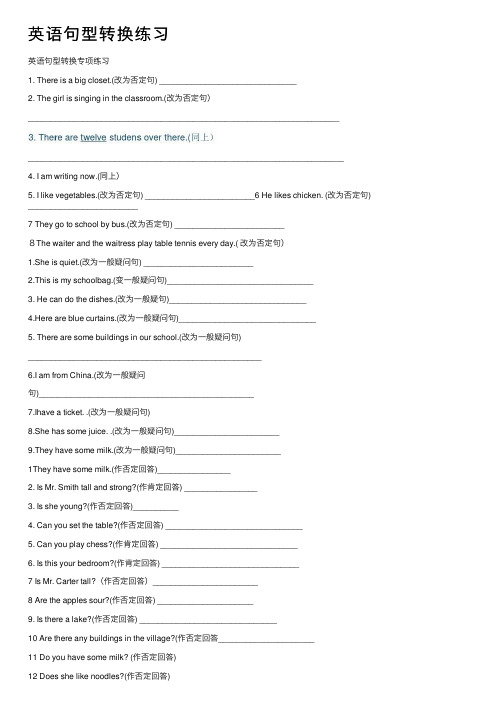
英语句型转换练习英语句型转换专项练习1. There is a big closet.(改为否定句) ______________________________2. The girl is singing in the classroom.(改为否定句)_________________________________________________________________________________________________________________________________________4. I am writing now.(同上)5. I like vegetables.(改为否定句) ________________________6 He likes chicken. (改为否定句) ________________________7 They go to school by bus.(改为否定句) ________________________8The waiter and the waitress play table tennis every day.( 改为否定句)1.She is quiet.(改为⼀般疑问句) ________________________2.This is my schoolbag.(变⼀般疑问句)________________________________3. He can do the dishes.(改为⼀般疑句)______________________________4.Here are blue curtains.(改为⼀般疑问句)______________________________5. There are some buildings in our school.(改为⼀般疑问句)___________________________________________________6.I am from China.(改为⼀般疑问句)_______________________________________________7.Ihave a ticket. .(改为⼀般疑问句)8.She has some juice. .(改为⼀般疑问句)_______________________9.They have some milk.(改为⼀般疑问句)_______________________1They have some milk.(作否定回答)________________2. Is Mr. Smith tall and strong?(作肯定回答) ________________3. Is she young?(作否定回答)__________4. Can you set the table?(作否定回答) ______________________________5. Can you play chess?(作肯定回答) ______________________________6. Is this your bedroom?(作肯定回答) ______________________________7 Is Mr. Carter tall?(作否定回答)_______________________8 Are the apples sour?(作否定回答) _____________________9. Is there a lake?(作否定回答) ______________________________10 Are there any buildings in the village?(作否定回答_____________________11 Do you have some milk? (作否定回答)12 Does she like noodles?(作否定回答)13Do they play fooltall on Sunday?(作否定回答)1. She's very kind and pretty.(对划线部分提问) ________________ 2 That young lady is our principal.(对划线部分提问) ____________3. Today is Saturday.(对划线部分提问) ________________________4. We have Chinese and math on Wednesday.(对划线部分提问) ____ 5 He is very tall.(对划线部分提问)_______________________6. I would like the orange juice.(对划线部分提问) _____________Lingling like a coke.(对划线部分提问) _____________7. Pork is my favourite food.(对划线部分提问)____________________________________________________________8. I can put away the clothes.(对划线部分提问)____________________________________________________________9. I can see a mirror on the wall.(对划线部分提问)______________________________10. The shelf is near the desk.(对划线部分提问)______________________________11. There are two curtains.(对划线部分提问)______________________________12. It's a new desk.( 对划线部分提问) ______________________________13. There is a small house in my village.(改为复数形式)______________________________14. I can run on the grass.(对划线部分提问)______________________________15. I like this park.(改为否定句) ______________________________16. There are some tall buildings in the city.(改为⼀般疑问句)__________________________17. There is a bridge in my village.(改为复数形式)______________________________18. 不,没有。
- 1、下载文档前请自行甄别文档内容的完整性,平台不提供额外的编辑、内容补充、找答案等附加服务。
- 2、"仅部分预览"的文档,不可在线预览部分如存在完整性等问题,可反馈申请退款(可完整预览的文档不适用该条件!)。
- 3、如文档侵犯您的权益,请联系客服反馈,我们会尽快为您处理(人工客服工作时间:9:00-18:30)。
项目二:变一般疑问句
• • • • • • • • • • 1. I am listening to music. → Are you listening to music? 2. Sarah can clean the classroom. → Can Sarah clean the classroom? 3. There are some flowers in the park. → Are there any flowers in the park? 4. This is my sister. → Is that your sister? 5. We are sweeping the floor. → Are you sweeping the floor?
项目六:变反义疑问句
• • • • 1. They seldom come late, __________? 2. He has two sisters,_________? 3. He used to take pictures there, _______? 4. Jim will be a scientist in 10 years, ____ ___? • 5. There is little water left, _______ _______?
项目三:变复数
• • • • • • • • • • 1. This is my book.(复数) → These are my books. 2. Is that a cat?(复数) → Are those cats? 3. There is a T-shirt in the box.(变复数句) → There are some T-shirts in the box. 4. Is there a book in the bag?(变成复数句) → Are there any books in the bag? 5. There is an old man in the room. ( 改为复数句子) → There are some old men in the room.
• • • • • • • • • •
ห้องสมุดไป่ตู้
6. We need some masks. → Do you need any masks? 7. They like playing basketball. → Do they like playing basketball? 8. Lily and Li Lei live in a new house. → Do Lily and Li Lei live in a new house? 9. Tom likes listening to music. → Does Tom like listening to music? 10. He went to the zoo yesterday. → Did he go to the zoo yesterday?
• • • • • • • • • •
6. How do you like science? → _____ do you ______ ____ science?、 7. Why don’t you play basketball with us? → Why ____ play basketball with us? 8. What’s the matter with you? → ______ _____with you? 9. Where’s the supermarket? → _______ can I _______ ______ the supermarket? 10. Ming Ming walks to school every day. → Ming Ming _____ to school ____ ____ every day.
项目四:对划线部分提问
• • • • • • • • • • 1. I came back at five thirty. → When did you come back? 2. They are my father’s shoes. → Whose shoes are they? 3. Mary’s bag is on the table. → Where is Mary's bag? 4. We are sweeping the floor. → What are you doing? 5. He comes to China once a year. → How often does he come to China?
句型转换专项练习
项目一:变否定句
• • • • • • • • • • 1. My brother goes to school on foot. → My brother doesn't go to school on foot. 2. I can sing and dance. → I can not sing and dance. 3. I have something to say in the meeting. → I don't have anything to say in the meeting. 4. Li Lei sent me a wallet on my birthday. → Li Lei didn't send me a wallet on my birthday. 5. He needs some help from his classmates. → He doesn't need any help from his classmates.
• • • • • • • • • •
6. This pen is five Yuan. → How much is that pen? 7. He likes the coat because of its style. → Why does he like the coat? 8. My winter holiday was very interesting. → How was your winter holiday? 9. Alan likes to play with Bill. → Who does Alan like to play with? 10. There are thirty people in the room. → How many people are there in the room?
项目五:同义句转换
• • • • • • • • • • 1. It’s time for breakfast. → It’s time ____ ____ breakfast. 2. My friends buy me some flowers → My friends _____ some flowers ____ me. 3. Reading is interesting. → ___ is _____ ____read. 4. He likes apples, too. → He ____ _____ apples. 5. What’s your favorite subject? → What subject ____ you _____ _____?
